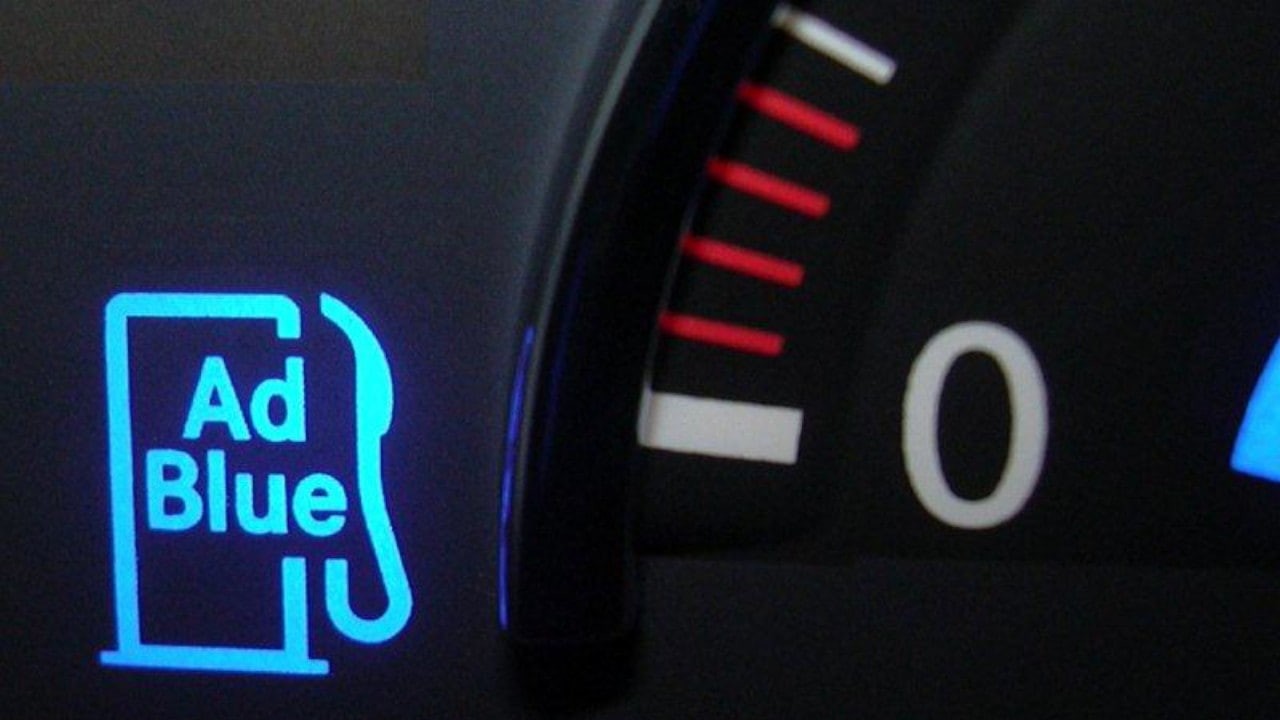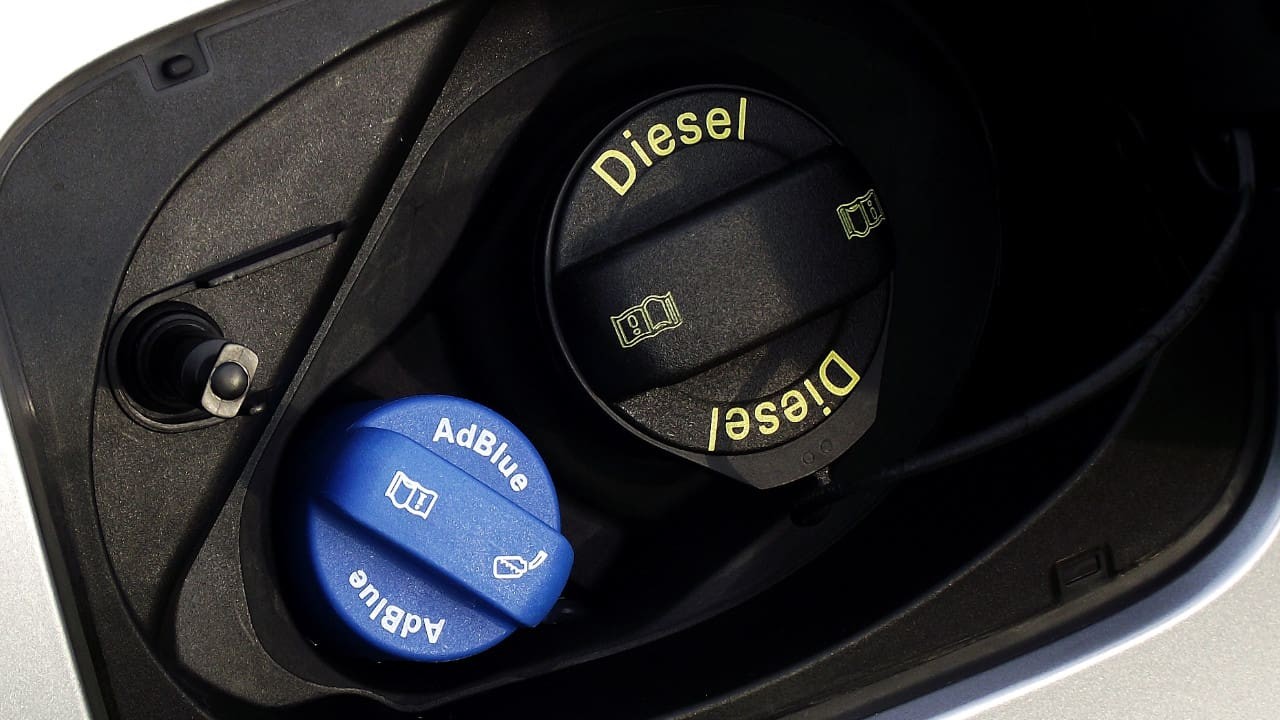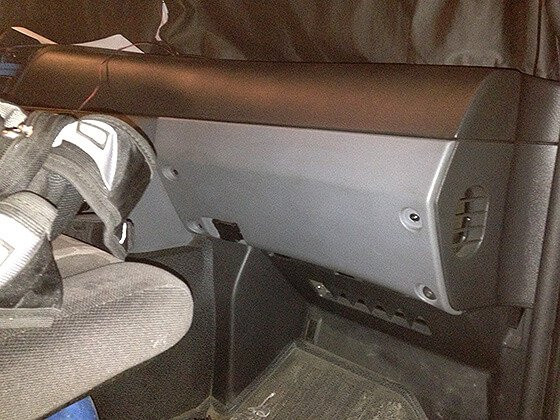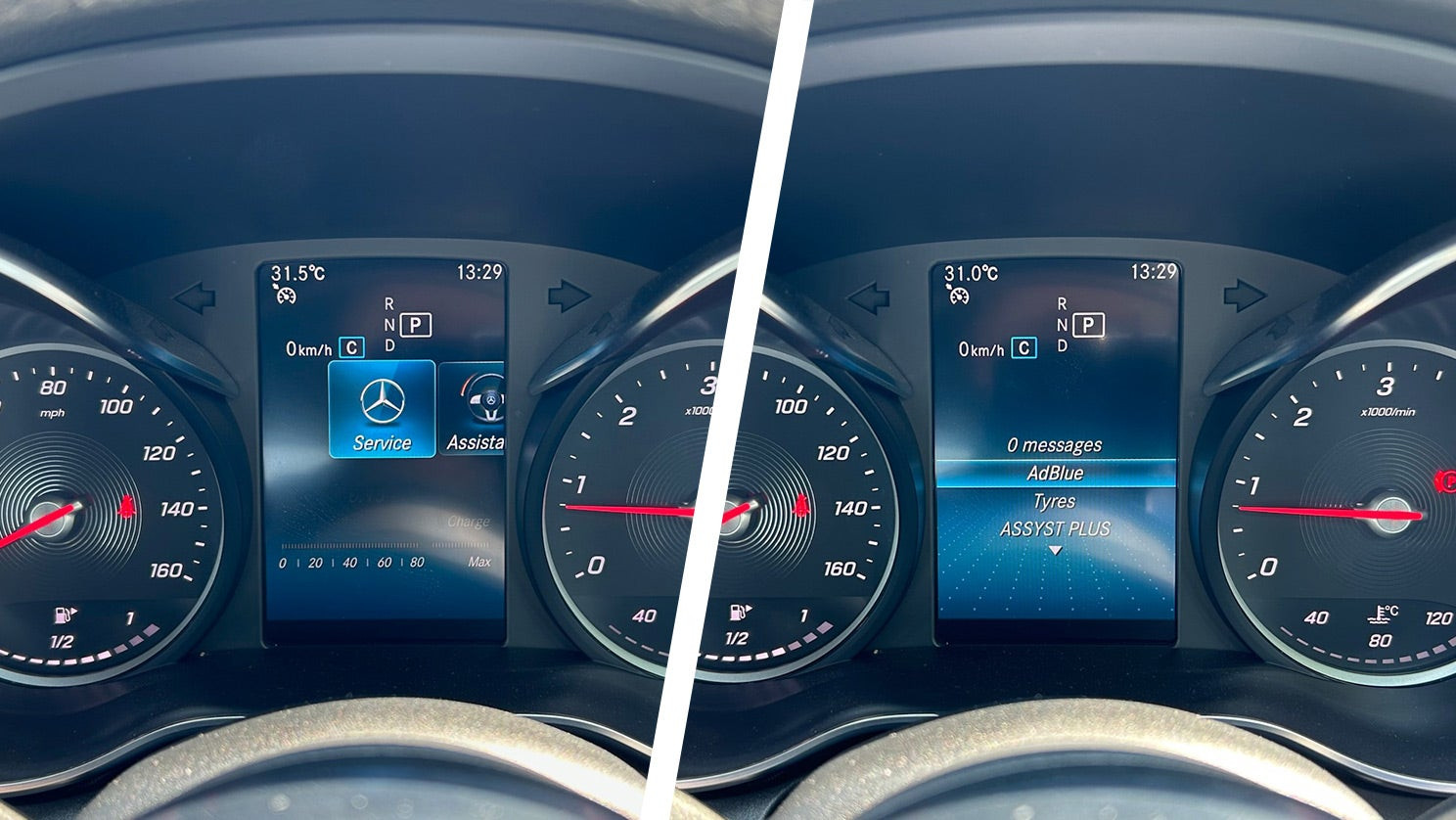What Is AdBlue in Mercedes: The Complete Guide

At CARDIAGTECH.NET, we understand the importance of keeping your Mercedes-Benz running smoothly and efficiently. What is AdBlue in Mercedes vehicles? It’s a crucial component for reducing emissions. This comprehensive guide explains everything you need to know about diesel exhaust fluid, its function, and how to maintain it, ensuring your vehicle meets environmental standards and performs optimally. Discover how to troubleshoot common issues and where to find reliable repair tools and automotive diagnostic solutions to keep your Mercedes-Benz in top condition.
1. Understanding AdBlue in Your Mercedes-Benz
AdBlue, also known as Diesel Exhaust Fluid (DEF), is a non-toxic, colorless solution comprising urea and deionized water. It’s a vital component in modern Mercedes-Benz diesel vehicles equipped with Selective Catalytic Reduction (SCR) technology. The primary purpose of AdBlue is to reduce nitrogen oxide (NOx) emissions, a significant contributor to air pollution.
1.1. The Role of Selective Catalytic Reduction (SCR)
SCR technology is employed in Mercedes-Benz diesel engines to minimize harmful emissions. The system injects AdBlue into the exhaust stream, where it reacts with NOx in the catalytic converter. This chemical reaction converts NOx into harmless nitrogen and water, significantly reducing the environmental impact of your vehicle.
1.2. Why Mercedes-Benz Uses AdBlue
Mercedes-Benz incorporates AdBlue to comply with stringent emissions regulations, such as Euro 6 standards. By using AdBlue, Mercedes-Benz diesel vehicles can achieve lower NOx emissions without compromising performance or fuel efficiency. This commitment to environmental responsibility ensures that Mercedes-Benz remains at the forefront of automotive innovation.
2. Identifying AdBlue Requirements for Your Mercedes-Benz Model
Not all Mercedes-Benz models require AdBlue. Typically, diesel vehicles manufactured after 2015 are equipped with SCR technology and necessitate AdBlue. However, it’s essential to verify your specific model’s requirements to ensure proper maintenance and compliance.
2.1. Checking Your Vehicle’s Specifications
Refer to your Mercedes-Benz owner’s manual to determine whether your vehicle requires AdBlue. The manual provides detailed information about your vehicle’s emissions control systems and fluid requirements.
2.2. Locating the AdBlue Filler Cap
The AdBlue filler cap is usually located near the fuel filler cap or in the trunk. It is typically identified by a blue cap with the AdBlue symbol. Knowing its location is crucial for easy refills.
2.3. Models Typically Requiring AdBlue
Common Mercedes-Benz models that typically require AdBlue include:
- C-Class (diesel models)
- E-Class (diesel models)
- GLC and GLE SUVs (diesel models)
- Sprinter vans (diesel models)
3. Monitoring and Maintaining AdBlue Levels in Your Mercedes-Benz
Keeping an eye on your AdBlue levels is crucial for maintaining optimal performance and avoiding potential issues. Mercedes-Benz provides several ways to monitor these levels, ensuring you’re always informed.
3.1. Dashboard Warning Lights and Messages
The most common indicator of low AdBlue levels is a warning light or message on your dashboard. These alerts typically appear when the AdBlue level drops below a certain threshold, prompting you to refill the tank.
- Yellow Warning Light: Indicates low AdBlue levels, typically with around 1,500 to 1,650 miles remaining.
- Red Warning Light: Signifies critically low AdBlue levels, requiring immediate attention.
 AdBlue Warning Light
AdBlue Warning Light
3.2. Checking AdBlue Levels Through the Instrument Cluster
Many Mercedes-Benz models allow you to check the exact AdBlue level through the instrument cluster. Navigate to the “Service” menu or a dedicated “AdBlue” section to view the current level. Consult your owner’s manual for specific instructions on accessing this information.
3.3. Consequences of Ignoring AdBlue Warnings
Ignoring AdBlue warning lights can lead to several adverse consequences:
- Reduced Engine Performance: Your vehicle’s performance may be limited to prevent excessive emissions.
- Engine Immobilization: In some cases, the engine may not start if the AdBlue tank is completely empty.
- Potential Fines: Operating a vehicle without sufficient AdBlue can result in fines in certain jurisdictions.
4. Step-by-Step Guide to Refilling AdBlue in Your Mercedes-Benz
Refilling AdBlue is a straightforward process that can be done at home or at a service station. Follow these steps to ensure a successful refill:
4.1. Gathering Necessary Supplies
Before starting, gather the following supplies:
- AdBlue Fluid: Purchase AdBlue fluid that meets ISO 22241 standards.
- Funnel: Use a funnel to prevent spills during the refill process.
- Gloves: Wear gloves to protect your hands from potential skin irritation.
- Clean Cloth: Keep a clean cloth handy to wipe up any spills.
4.2. Locating the AdBlue Tank
As mentioned earlier, the AdBlue tank is typically located near the fuel filler cap or in the trunk. Refer to your owner’s manual for the exact location.
4.3. Refilling the Tank Safely
- Open the AdBlue Tank: Unscrew the blue AdBlue filler cap.
- Insert the Funnel: Place the funnel into the filler neck.
- Pour AdBlue Fluid: Carefully pour AdBlue fluid into the tank until it reaches the maximum fill level. Avoid overfilling.
- Clean Up Spills: Use a clean cloth to wipe up any spills around the filler neck.
- Secure the Cap: Replace the AdBlue filler cap and tighten it securely.
4.4. Recommended AdBlue Brands
While Mercedes-Benz does not require a specific brand of AdBlue, it’s essential to choose a reputable brand that meets ISO 22241 standards. Some recommended brands include:
- BlueDEF
- Peak BlueDEF
- AdBlue by BASF
5. Resetting the AdBlue Warning Light After Refilling
After refilling your AdBlue tank, the warning light may not automatically disappear. Here’s how to reset it:
5.1. Starting the Engine
Start your Mercedes-Benz engine and let it run for a few minutes. This allows the system to recognize the new AdBlue level.
5.2. Driving a Short Distance
In some cases, the warning light may require a short drive to reset. Drive for about 10-15 minutes to allow the system to recalibrate.
5.3. Manual Reset Procedure
If the warning light persists, you may need to perform a manual reset using the instrument cluster:
- Turn on the Ignition: Turn the ignition to the “on” position without starting the engine.
- Navigate to the Service Menu: Use the steering wheel buttons to navigate to the “Service” menu in the instrument cluster.
- Select AdBlue Reset: Look for an “AdBlue Reset” option and select it.
- Confirm the Reset: Follow the on-screen prompts to confirm the reset.
5.4. When to Seek Professional Assistance
If the warning light continues to illuminate after attempting these steps, it may indicate a more significant issue with the SCR system. In such cases, consult a qualified Mercedes-Benz technician for further diagnosis and repair.
6. Troubleshooting Common AdBlue System Problems
Like any automotive system, the AdBlue system can encounter problems. Recognizing these issues early can prevent costly repairs.
6.1. AdBlue Warning Light Stays On
If the AdBlue warning light remains on after refilling and attempting a reset, consider the following:
- Check for Leaks: Inspect the AdBlue tank and lines for any signs of leaks.
- Verify AdBlue Quality: Ensure the AdBlue fluid meets ISO 22241 standards and is not contaminated.
- SCR System Malfunction: A faulty SCR system component, such as the NOx sensor or AdBlue injector, may be the cause.
6.2. AdBlue System Error Messages
Error messages related to the AdBlue system can indicate various issues:
- “Check AdBlue Level”: Indicates low AdBlue levels, even after refilling.
- “AdBlue System Malfunction”: Suggests a problem with the SCR system components.
- “Incorrect AdBlue Fluid”: Indicates the use of non-compliant AdBlue fluid.
6.3. Crystalline Deposits in the AdBlue System
AdBlue can crystallize over time, leading to blockages in the system. Regular maintenance and the use of high-quality AdBlue fluid can help prevent this issue.
6.4. Diagnosing with CARDIAGTECH.NET Tools
At CARDIAGTECH.NET, we offer a range of diagnostic tools that can help you identify and troubleshoot AdBlue system problems. Our tools provide detailed diagnostic information, allowing you to pinpoint the exact cause of the issue and perform the necessary repairs. Contact us at +1 (641) 206-8880 for expert advice on selecting the right diagnostic tools for your needs.
7. The Environmental Benefits of AdBlue
AdBlue plays a crucial role in reducing the environmental impact of diesel vehicles. By converting harmful NOx emissions into harmless nitrogen and water, AdBlue helps improve air quality and protect the environment.
7.1. Reducing Nitrogen Oxide (NOx) Emissions
NOx emissions are a major contributor to air pollution, leading to respiratory problems and other health issues. AdBlue significantly reduces NOx emissions, helping to create a cleaner and healthier environment.
7.2. Complying with Emissions Regulations
AdBlue enables Mercedes-Benz diesel vehicles to comply with stringent emissions regulations, such as Euro 6 standards. This ensures that your vehicle meets the latest environmental requirements and avoids potential fines.
7.3. Contributing to a Sustainable Future
By using AdBlue, you’re contributing to a more sustainable future. Reducing emissions helps mitigate the effects of climate change and protects our planet for future generations.
8. Where to Purchase AdBlue for Your Mercedes-Benz
AdBlue is widely available at various locations, making it easy to keep your tank filled.
8.1. Authorized Mercedes-Benz Dealerships
Purchasing AdBlue from an authorized Mercedes-Benz dealership ensures that you’re getting high-quality fluid that meets the required standards. Dealerships also offer AdBlue refill services.
8.2. Auto Parts Stores
Auto parts stores like AutoZone, Advance Auto Parts, and O’Reilly Auto Parts sell AdBlue in various sizes. These stores typically offer a range of brands, allowing you to choose the one that best fits your needs.
8.3. Truck Stops and Service Stations
Many truck stops and service stations also carry AdBlue, especially those located along major highways. These locations often offer AdBlue in bulk, making it convenient for long-distance travelers.
8.4. Online Retailers
Online retailers like Amazon sell AdBlue and deliver it directly to your door. This option is convenient if you prefer to shop from home.
9. Tips for Storing AdBlue Properly
Proper storage is crucial for maintaining the quality of AdBlue. Follow these tips to ensure that your AdBlue fluid remains effective:
9.1. Storage Temperature
Store AdBlue in a cool, dry place, away from direct sunlight. The ideal storage temperature is between 14°F and 86°F (-10°C and 30°C).
9.2. Shelf Life
AdBlue has a shelf life of approximately one year when stored properly. Check the expiration date on the container before use.
9.3. Container Type
Store AdBlue in its original container or a container specifically designed for AdBlue. Avoid using containers made of aluminum, copper, or zinc, as these materials can contaminate the fluid.
9.4. Avoiding Contamination
Prevent contamination by keeping the container tightly sealed when not in use. Avoid pouring AdBlue into dirty or unapproved containers.
10. The Cost of AdBlue and Factors Affecting It
The cost of AdBlue can vary depending on several factors. Understanding these factors can help you budget for AdBlue refills.
10.1. Price per Gallon
The average price of AdBlue ranges from $10 to $20 per gallon, depending on the brand and location.
10.2. Factors Influencing Price
- Brand: Some brands may be more expensive than others due to perceived quality or marketing.
- Location: Prices can vary depending on the region and availability.
- Quantity: Purchasing AdBlue in bulk may result in a lower price per gallon.
10.3. AdBlue Consumption Rate
The AdBlue consumption rate depends on several factors, including:
- Driving Style: Aggressive driving can increase AdBlue consumption.
- Vehicle Load: Carrying heavy loads can also increase consumption.
- Driving Conditions: Stop-and-go traffic and hilly terrain can increase consumption.
10.4. Estimating Your AdBlue Costs
To estimate your AdBlue costs, consider your average mileage and driving conditions. On average, Mercedes-Benz diesel vehicles consume about 1-3% of their fuel consumption in AdBlue.
11. Choosing the Right Diagnostic Tools for AdBlue System Maintenance
Maintaining the AdBlue system in your Mercedes-Benz requires the right diagnostic tools. At CARDIAGTECH.NET, we offer a comprehensive range of tools to help you keep your vehicle running smoothly.
11.1. Importance of Accurate Diagnostics
Accurate diagnostics are crucial for identifying and resolving AdBlue system problems. Using the right tools can save you time and money by pinpointing the exact cause of the issue.
11.2. Key Features to Look For in a Diagnostic Tool
When choosing a diagnostic tool, consider the following features:
- Compatibility: Ensure the tool is compatible with your Mercedes-Benz model.
- Functionality: Look for tools that can read and clear diagnostic trouble codes (DTCs), perform system tests, and provide live data.
- User-Friendliness: Choose a tool that is easy to use and provides clear, concise information.
- Updates: Ensure the tool can be updated with the latest software and vehicle information.
11.3. Recommended Diagnostic Tools from CARDIAGTECH.NET
At CARDIAGTECH.NET, we offer a variety of diagnostic tools suitable for AdBlue system maintenance:
- OBD-II Scanners: These tools can read and clear DTCs, providing basic diagnostic information.
- Professional Diagnostic Scanners: These advanced tools offer comprehensive diagnostic capabilities, including system tests, live data, and bidirectional control.
- Mercedes-Benz Specific Diagnostic Tools: These tools are designed specifically for Mercedes-Benz vehicles and offer advanced diagnostic features.
11.4. How CARDIAGTECH.NET Can Help
At CARDIAGTECH.NET, we understand the challenges faced by automotive technicians and shop owners. That’s why we offer a wide range of high-quality diagnostic tools and equipment at competitive prices. Our tools are designed to help you:
- Increase Efficiency: Reduce diagnostic time and improve workflow.
- Improve Accuracy: Pinpoint the exact cause of the issue.
- Enhance Customer Satisfaction: Provide reliable and accurate repairs.
We also offer expert support and training to help you get the most out of your diagnostic tools. Our team of experienced technicians is available to answer your questions and provide guidance. Contact us at +1 (641) 206-8880 for expert advice.
12. Maintaining Your Mercedes-Benz AdBlue System with CARDIAGTECH.NET
At CARDIAGTECH.NET, we are committed to providing you with the tools and resources you need to maintain your Mercedes-Benz AdBlue system. Our extensive range of diagnostic tools ensures that you can accurately identify and resolve any issues, keeping your vehicle running smoothly and efficiently.
12.1. Comprehensive Diagnostic Solutions
Our diagnostic solutions cover all aspects of the AdBlue system, including:
- Reading and Clearing DTCs: Quickly identify and clear diagnostic trouble codes.
- System Tests: Perform comprehensive system tests to evaluate the performance of the AdBlue system.
- Live Data: Monitor real-time data to diagnose issues and verify repairs.
- Bidirectional Control: Control system components to perform tests and calibrations.
12.2. Expert Support and Training
We offer expert support and training to help you get the most out of your diagnostic tools. Our team of experienced technicians is available to answer your questions and provide guidance.
12.3. Ensuring Optimal Vehicle Performance
By using CARDIAGTECH.NET diagnostic tools, you can ensure that your Mercedes-Benz AdBlue system is functioning correctly, optimizing vehicle performance and reducing emissions.
13. The Future of AdBlue Technology in Mercedes-Benz Vehicles
As environmental regulations become more stringent, AdBlue technology will continue to play a crucial role in Mercedes-Benz vehicles.
13.1. Advancements in SCR Technology
Future advancements in SCR technology will likely focus on improving efficiency and reducing costs. This may involve the development of more efficient catalysts and more precise AdBlue injection systems.
13.2. Integration with Electric Vehicles
As Mercedes-Benz transitions to electric vehicles, AdBlue technology may be integrated with hybrid systems to further reduce emissions.
13.3. The Role of Government Regulations
Government regulations will continue to drive the development and adoption of AdBlue technology. As emissions standards become more stringent, AdBlue will become even more critical for meeting these requirements.
14. Mercedes-Benz AdBlue: Frequently Asked Questions (FAQs)
Here are some frequently asked questions about AdBlue in Mercedes-Benz vehicles:
14.1. What is AdBlue made of?
AdBlue is a solution made of urea and deionized water. It is non-toxic and safe to handle.
14.2. Is AdBlue the same as diesel fuel?
No, AdBlue is not the same as diesel fuel. AdBlue is a separate fluid that is injected into the exhaust system to reduce NOx emissions.
14.3. Can I use any brand of AdBlue?
You can use any brand of AdBlue as long as it meets ISO 22241 standards.
14.4. How often do I need to refill AdBlue?
The frequency of AdBlue refills depends on your driving style and conditions. On average, you may need to refill AdBlue every 5,000 to 10,000 miles.
14.5. What happens if I run out of AdBlue?
If you run out of AdBlue, your vehicle’s performance may be limited, and in some cases, the engine may not start.
14.6. Can I mix AdBlue with water?
No, you should never mix AdBlue with water or any other fluid. This can damage the SCR system.
14.7. Is AdBlue harmful to the environment?
No, AdBlue is not harmful to the environment. In fact, it helps reduce NOx emissions, which are harmful to the environment.
14.8. Can I make my own AdBlue?
No, you should never attempt to make your own AdBlue. It is essential to use AdBlue that meets ISO 22241 standards to avoid damaging the SCR system.
14.9. How do I dispose of AdBlue?
AdBlue can be disposed of at most auto parts stores or recycling centers. Check with your local regulations for proper disposal methods.
14.10. What is the warranty on the AdBlue system?
The warranty on the AdBlue system is typically covered under the vehicle’s emissions warranty. Check your warranty documentation for specific details.
15. Conclusion: Keeping Your Mercedes-Benz Running Clean with AdBlue
AdBlue is an essential component for maintaining the performance and environmental compliance of your Mercedes-Benz diesel vehicle. By understanding the role of AdBlue, monitoring your fluid levels, and performing regular maintenance, you can ensure that your vehicle runs smoothly and efficiently. At CARDIAGTECH.NET, we are dedicated to providing you with the tools and resources you need to keep your Mercedes-Benz in top condition. From comprehensive diagnostic solutions to expert support and training, we are here to help you every step of the way.
Remember, maintaining your AdBlue system is not just about keeping your vehicle running smoothly; it’s also about contributing to a cleaner and healthier environment. By using AdBlue, you’re playing a vital role in reducing emissions and protecting our planet for future generations.
If you have any questions or need assistance with your Mercedes-Benz AdBlue system, don’t hesitate to contact us at CARDIAGTECH.NET. Our team of experienced technicians is ready to help you with all your diagnostic and maintenance needs. Contact us today at 276 Reock St, City of Orange, NJ 07050, United States, or call us at +1 (641) 206-8880. You can also visit our website at CARDIAGTECH.NET for more information and to explore our range of diagnostic tools and equipment.
Are you facing challenges in maintaining your Mercedes-Benz AdBlue system? Do you need reliable diagnostic tools to accurately identify and resolve issues? Contact CARDIAGTECH.NET today for expert advice and support. Our comprehensive range of diagnostic solutions and experienced team can help you keep your Mercedes-Benz running smoothly and efficiently. Don’t let AdBlue system problems slow you down – reach out to us now and experience the CARDIAGTECH.NET difference! Call us at +1 (641) 206-8880.





